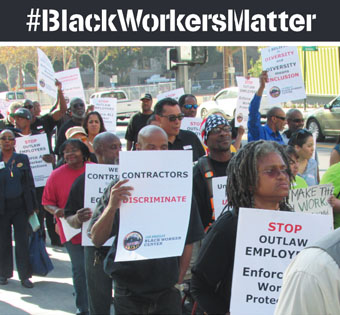NATIONAL
#BlackWorkersMatter shifts dialogue to jobs
(May 6, 2015) — The #BlackLivesMatter movement, founded after George Zimmerman’s acquittal of murder in the death of black teenager Trayvon Martin, has served as a focus point for protest and activism in response to the violent deaths of black people in Ferguson, in New York City, in Baltimore, and across America.
But asserting that black lives matter also means that the quality of those lives matters. Economic opportunity is inextricably linked to the quality of the lives lived by blacks in America. That means taking a hard look at the black jobs crisis that has existed for decades in this country and been exacerbated in recent years by an economic recovery from the Great Recession of 2008 that has benefited most demographic groups, but not African Americans.
 A new report by the Discount Foundation and the Neighborhood Funders Group thoroughly examines the black jobs crisis, its impacts and contributing factors, and possible ways forward and out of it. The report’s title, #BlackWorkersMatter, is intended to both honor the movement and situate worker organizing in the broader context of building black power for human rights and dignity. (Download the full report.)
A new report by the Discount Foundation and the Neighborhood Funders Group thoroughly examines the black jobs crisis, its impacts and contributing factors, and possible ways forward and out of it. The report’s title, #BlackWorkersMatter, is intended to both honor the movement and situate worker organizing in the broader context of building black power for human rights and dignity. (Download the full report.)
“Just as the #BlackLivesMatter movement has emerged as part of a renewed spirit of black activism, this #BlackWorkersMatter report unveils the harsh economic reality of a job market that relegates African Americans to the lowest rungs of the employment ladder, and an economy in black communities that is permanently in recession,” said Dorian Warren, a Discount Foundation board member and Columbia University associate professor. “This report’s findings reflect the long-standing concerns of many social scientists, community organizers, and everyday workers who are seeing the toll that the jobs crisis and low wages are having on lack workers and their families.”
In #BlackWorkersMatter, authors Algernon Austin, Marc Bayard, Linda Burnham, Steven Pitts, and Sean Thomas-Breitfeld share new research on the economic and employment barriers facing black workers and the grassroots organizing to build the political power of black workers to transform these conditions. It comprises six sections. The first and longest report focuses on black worker organizing, its history, and challenges. It is followed by four reports that address various aspects of the black jobs crisis, its causes, its effects, and the potential for black worker organizing to provide a path to its resolution.
The final section makes recommendations for a path forward. It includes policy priorities that are ostensibly “race neutral,” but are key to improving the quality of jobs for black workers, and black women in particular, including:
► Raise the minimum wage at the local, state, and federal level;
► Raise the floor for low-wage work in fast-food, healthcare support, and retail;
► Provide benefits to low-wage workers, including paid sick leave and paid family leave;
► Minimize involuntary part-time work and unpredictable, on-demand scheduling;
► Secure overtime pay for all workers, including domestic and agricultural workers; and
► Ban questions regarding conviction history from employment applications.





